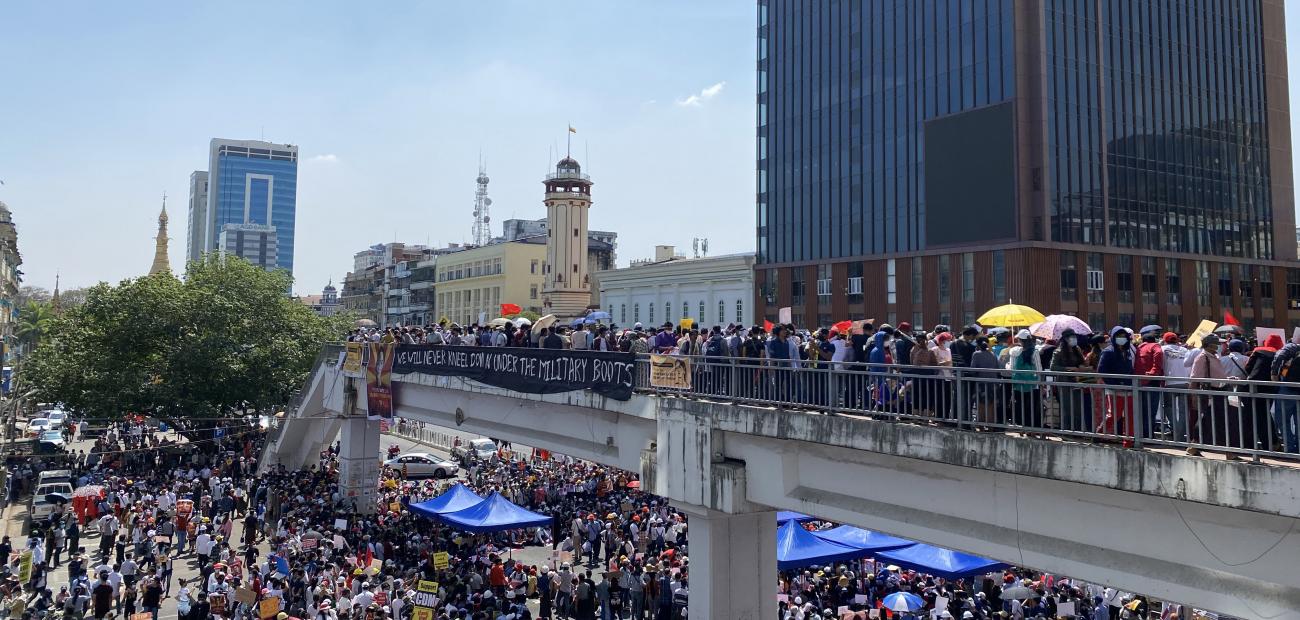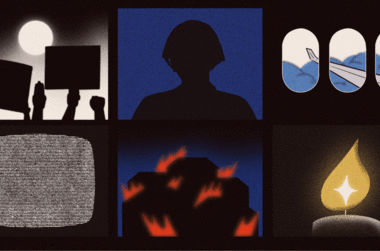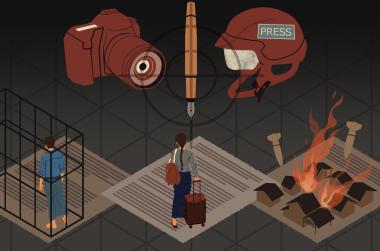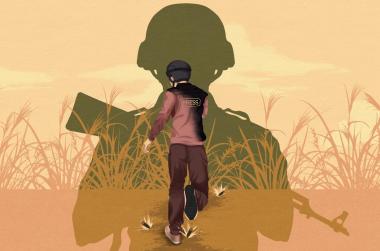The writer, Athens Zaw Zaw, is a journalist who has had to leave Myanmar.
I am writing this in a small town at the border between Myanmar and Thailand. These reflections come from my painful hope for the future of our country.
I remember everything. Leading up to the military power grab, rumours had flown around and there were even jokes on social media scorning the military chief Min Aung Hlaing. Things like: "If you want to take (the power), take the rubbish out." People thought a coup was so impossible in the new Myanmar, they ridiculed the very idea of it.
Little did people know. On February 1, 2021 I woke up just before dawn to the incessant sound of my phone ringing. It was a close friend, and she said the military was staging a coup. Within 15 minutes, I knew it was true. I felt dark, sad, and hopeless. I could not sleep again. On social media I saw the shouts of anger and cries of hurt. Nothing was funny anymore.
I was staying at a hotel in Yangon that day, waiting to attend a meeting. Since then I have never been home to my apartment. I went into hiding, meeting only some of my close friends and not letting the people I met know that I am a journalist.
I felt I was back to those old days, when the military bullied civilians relentlessly.
Our country had barely survived the decades under the military’s awful control. Now after just a few years off, it seemed like it was on the brink of collapsing.

People did not take to the streets immediately but finally on February 4, there was a small protest in Mandalay, Myanmar’s second largest city, followed by a much bigger demonstration in Yangon on February 5. The protests eventually became massive and nationwide. Tens of thousands of people came out every day and, on some days, millions took to the streets across the country.
Unlike during the anti-junta uprising of 1988, people had social media and mobile phones and were much better equipped to see through the army propaganda. The atmosphere was very peaceful without any violence by the protesters. People helped each other, and even those who did not march provided first aid, transportation, meals and drinks etc.
People from different generations and different social backgrounds took part together; parents, students, working people, celebrities, rich families all came out to protest. But it was the young people - Generation Z but also Generation Y - who led the way.
I was out among the civilians protesting peacefully, in crowds where people played resistance-themed music calling for their rights and freedom.
But, the time of misery came: the brutality, the bloody crackdowns, torture, and murders by the junta's forces. It further fueled the anger of civilians.
I was reporting every day in Yangon. I witnessed the protests, crackdowns, and I saw the dead. I was afraid of being arrested, or tortured but I knew no other response except to report the news.

I think people, especially from the big cities, had maybe softened towards the military in recent years, believing the brutal crackdowns of 1988 to be a thing of the past.
Myanmar finally opened up ten years ago after decades of army rule and the whole country had gradually developed. Cities like Mandalay and Yangon became modernized with high rise buildings, while more businesses and work opportunities flowed in.
But the coup made people realize that the military had not changed at all. People from more peaceful ethnic Bamar areas in the central part of the country were not fully aware - or did not want to accept - the military’s human rights violations to other ethnic minorities, including Rakhine and Rohingya. But now people started to admit that they were wrong, and they never should have supported the military. This coup drags people back to 20 years ago and civilians will not be able to trust the military again for a generation.
Two years ago we had worries, but they were normal day-to-day concerns. The family business, health concerns, making sure the children got a good education, changing jobs. With the pandemic, everything paused. Business and schools were shut and we were only focusing on our health. Life was not easy, but we managed with the help of the whole society.
But since the coup, everything has collapsed. Education, Healthcare, Economy, there isn’t a single sector which is functional. As days go on, people suffer. It is not just that people’s quality of life has decreased - their very lives are in danger.

A couple of months after the coup, the crackdown on journalists had become intense and I had to flee the country.
On the day of the coup anniversary, the story I have been working on at the Thai border with Myanmar was published. I read it along with all the other articles published on Myanmar, thinking how much damage has been done. I am still shocked at how my country has fallen within the last 365 days.
As difficult as it sounds, I hope my country, Myanmar, will become a democratic federal union. It might be so far away for now, but I do believe that it will happen one day. I have witnessed and experienced the endless sacrifices made by the people of Myanmar, especially young people. Hundreds have died, families have been torn apart, and many people have thrown themselves into a desperate and determined battle to drive the military from power once and for all. Having seen all of this, I am sure there will be a victory in the end.
And if there is no victory, then that’s not the end.





